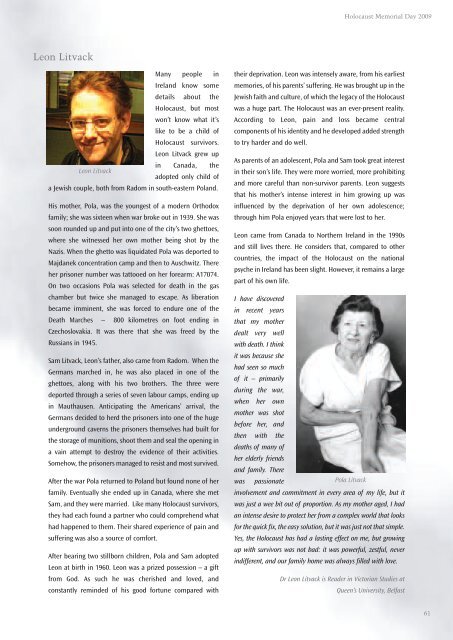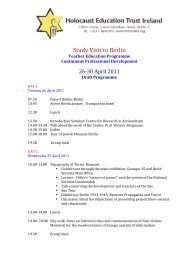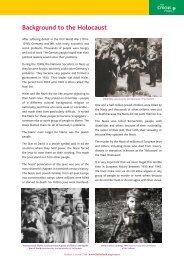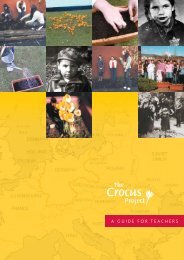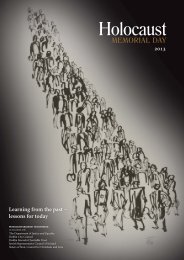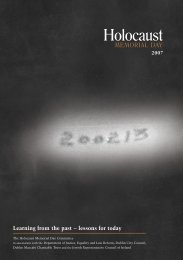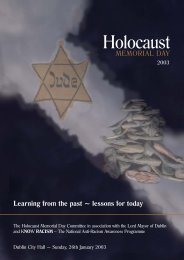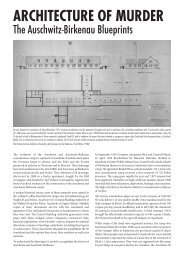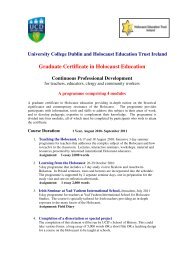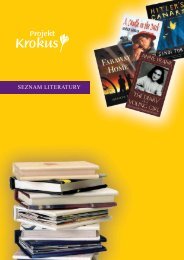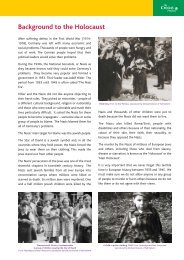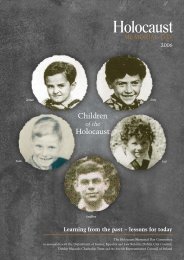Learning from the past ~ lessons for today - Holocaust Education ...
Learning from the past ~ lessons for today - Holocaust Education ...
Learning from the past ~ lessons for today - Holocaust Education ...
You also want an ePaper? Increase the reach of your titles
YUMPU automatically turns print PDFs into web optimized ePapers that Google loves.
<strong>Holocaust</strong> Memorial Day 2009<br />
Leon Litvack<br />
Many people in<br />
Ireland know some<br />
details about <strong>the</strong><br />
<strong>Holocaust</strong>, but most<br />
won’t know what it’s<br />
like to be a child of<br />
<strong>Holocaust</strong> survivors.<br />
Leon Litvack grew up<br />
in Canada, <strong>the</strong><br />
Leon Litvack<br />
adopted only child of<br />
a Jewish couple, both <strong>from</strong> Radom in south-eastern Poland.<br />
His mo<strong>the</strong>r, Pola, was <strong>the</strong> youngest of a modern Orthodox<br />
family; she was sixteen when war broke out in 1939. She was<br />
soon rounded up and put into one of <strong>the</strong> city’s two ghettoes,<br />
where she witnessed her own mo<strong>the</strong>r being shot by <strong>the</strong><br />
Nazis. When <strong>the</strong> ghetto was liquidated Pola was deported to<br />
Majdanek concentration camp and <strong>the</strong>n to Auschwitz. There<br />
her prisoner number was tattooed on her <strong>for</strong>earm: A17074.<br />
On two occasions Pola was selected <strong>for</strong> death in <strong>the</strong> gas<br />
chamber but twice she managed to escape. As liberation<br />
became imminent, she was <strong>for</strong>ced to endure one of <strong>the</strong><br />
Death Marches – 800 kilometres on foot ending in<br />
Czechoslovakia. It was <strong>the</strong>re that she was freed by <strong>the</strong><br />
Russians in 1945.<br />
Sam Litvack, Leon’s fa<strong>the</strong>r, also came <strong>from</strong> Radom. When <strong>the</strong><br />
Germans marched in, he was also placed in one of <strong>the</strong><br />
ghettoes, along with his two bro<strong>the</strong>rs. The three were<br />
deported through a series of seven labour camps, ending up<br />
in Mauthausen. Anticipating <strong>the</strong> Americans’ arrival, <strong>the</strong><br />
Germans decided to herd <strong>the</strong> prisoners into one of <strong>the</strong> huge<br />
underground caverns <strong>the</strong> prisoners <strong>the</strong>mselves had built <strong>for</strong><br />
<strong>the</strong> storage of munitions, shoot <strong>the</strong>m and seal <strong>the</strong> opening in<br />
a vain attempt to destroy <strong>the</strong> evidence of <strong>the</strong>ir activities.<br />
Somehow, <strong>the</strong> prisoners managed to resist and most survived.<br />
After <strong>the</strong> war Pola returned to Poland but found none of her<br />
family. Eventually she ended up in Canada, where she met<br />
Sam, and <strong>the</strong>y were married. Like many <strong>Holocaust</strong> survivors,<br />
<strong>the</strong>y had each found a partner who could comprehend what<br />
had happened to <strong>the</strong>m. Their shared experience of pain and<br />
suffering was also a source of com<strong>for</strong>t.<br />
After bearing two stillborn children, Pola and Sam adopted<br />
Leon at birth in 1960. Leon was a prized possession – a gift<br />
<strong>from</strong> God. As such he was cherished and loved, and<br />
constantly reminded of his good <strong>for</strong>tune compared with<br />
<strong>the</strong>ir deprivation. Leon was intensely aware, <strong>from</strong> his earliest<br />
memories, of his parents’ suffering. He was brought up in <strong>the</strong><br />
Jewish faith and culture, of which <strong>the</strong> legacy of <strong>the</strong> <strong>Holocaust</strong><br />
was a huge part. The <strong>Holocaust</strong> was an ever-present reality.<br />
According to Leon, pain and loss became central<br />
components of his identity and he developed added strength<br />
to try harder and do well.<br />
As parents of an adolescent, Pola and Sam took great interest<br />
in <strong>the</strong>ir son’s life. They were more worried, more prohibiting<br />
and more careful than non-survivor parents. Leon suggests<br />
that his mo<strong>the</strong>r’s intense interest in him growing up was<br />
influenced by <strong>the</strong> deprivation of her own adolescence;<br />
through him Pola enjoyed years that were lost to her.<br />
Leon came <strong>from</strong> Canada to Nor<strong>the</strong>rn Ireland in <strong>the</strong> 1990s<br />
and still lives <strong>the</strong>re. He considers that, compared to o<strong>the</strong>r<br />
countries, <strong>the</strong> impact of <strong>the</strong> <strong>Holocaust</strong> on <strong>the</strong> national<br />
psyche in Ireland has been slight. However, it remains a large<br />
part of his own life.<br />
I have discovered<br />
in recent years<br />
that my mo<strong>the</strong>r<br />
dealt very well<br />
with death. I think<br />
it was because she<br />
had seen so much<br />
of it – primarily<br />
during <strong>the</strong> war,<br />
when her own<br />
mo<strong>the</strong>r was shot<br />
be<strong>for</strong>e her, and<br />
<strong>the</strong>n with <strong>the</strong><br />
deaths of many of<br />
her elderly friends<br />
and family. There<br />
was passionate<br />
Pola Litvack<br />
involvement and commitment in every area of my life, but it<br />
was just a wee bit out of proportion. As my mo<strong>the</strong>r aged, I had<br />
an intense desire to protect her <strong>from</strong> a complex world that looks<br />
<strong>for</strong> <strong>the</strong> quick fix, <strong>the</strong> easy solution, but it was just not that simple.<br />
Yes, <strong>the</strong> <strong>Holocaust</strong> has had a lasting effect on me, but growing<br />
up with survivors was not bad: it was powerful, zestful, never<br />
indifferent, and our family home was always filled with love.<br />
Dr Leon Litvack is Reader in Victorian Studies at<br />
Queen’s University, Belfast<br />
61


